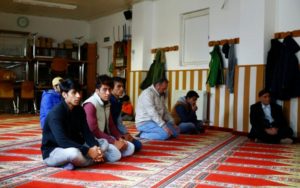
Cross-posted on the Corner:
One obvious concern about Angela Merkel’s decision last year to, so to speak, throw open the doors to Germany was the obvious risk that potential jihadists were among those that she was welcoming into the country. That concern hasn’t gone away, and nor should it, but here (via Reuters) is a twist:
Hani Salam escaped civil war in Syria and survived the journey from Egypt to Europe. But when he saw men with bushy long beards at a mosque near his current home in Cologne last November, he was worried. The men’s appearance reminded him of Jaish al-Islam, the Islamist rebels who took over his hometown near Damascus, said Salam, 36, who wears a mustache but no beard. One of them told Salam that “good Muslims grow beards, not moustaches,” he recalled – a centuries-old idea that he dismisses. “Everything about this mosque made me feel uneasy,” he said.
Syrians in Germany say many of the country’s Arab mosques are more conservative than those at home. Over two months, a dozen Syrians in six places of worship in three cities told Reuters they were uncomfortable with very conservative messages in Arabic-speaking mosques. People have criticized the way the newcomers dress and practice their religion, they said. Some insisted the Koran be interpreted word-for-word.
In Germany, other different faiths are traditionally supported by the state. But most of the country’s four million Muslims originally came from Turkey and attend Turkish-speaking mosques which are partly funded by Ankara. Last year around 890,000 asylum-seekers, more than 70 percent of them Muslims, entered the country. Around a third came from Syria. Many of them do not want to go to Turkish mosques because they do not understand the sermons. They prefer to worship where people speak Arabic. Yet in these mosques, other problems arise. They are often short of funds, or else supported by Saudi Arabia and the Gulf states. Some back ultra-conservative or highly literal interpretations of Islam, such as Wahhabism or Salafism.
Ah, the Saudis, yet again: Our allies. Still spreading poison, it seems.
And the Salafists have been trying a little outreach:
Germany’s domestic intelligence agency has recorded more than 320 attempts by Salafist Muslims to contact refugees last year, often by offering food, clothes, free copies of the Koran and help with German to asylum seekers living in shelters. Earlier this month, a Syrian committed suicide in prison after he was arrested on suspicion of planning to bomb an airport. His brother and friends in Germany have said he was “brainwashed” by ultra-conservative imams in Berlin…
Read the whole thing
